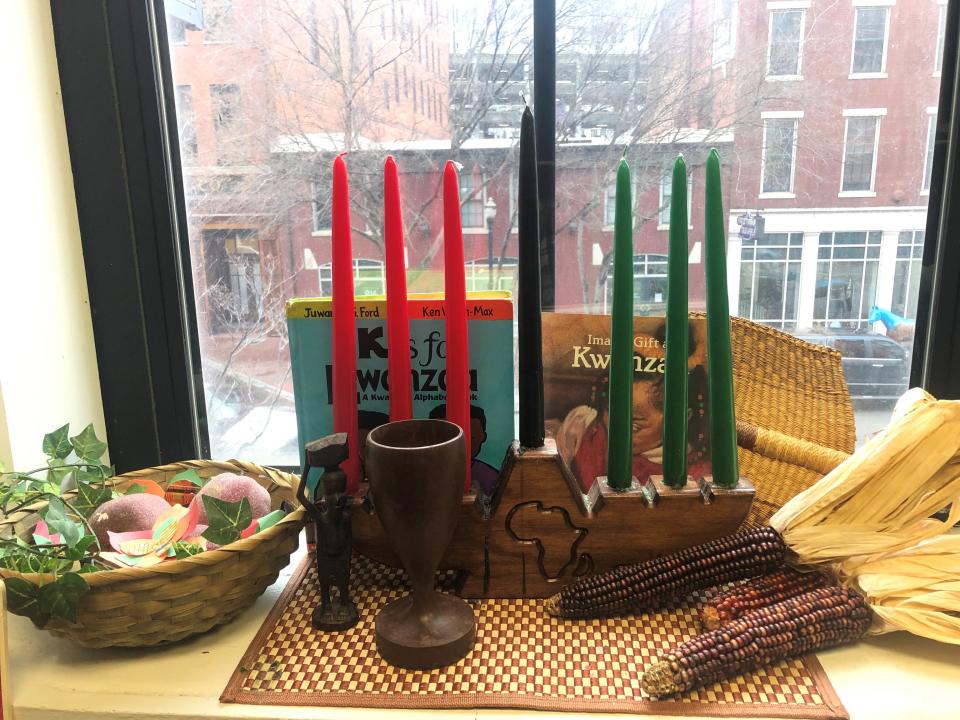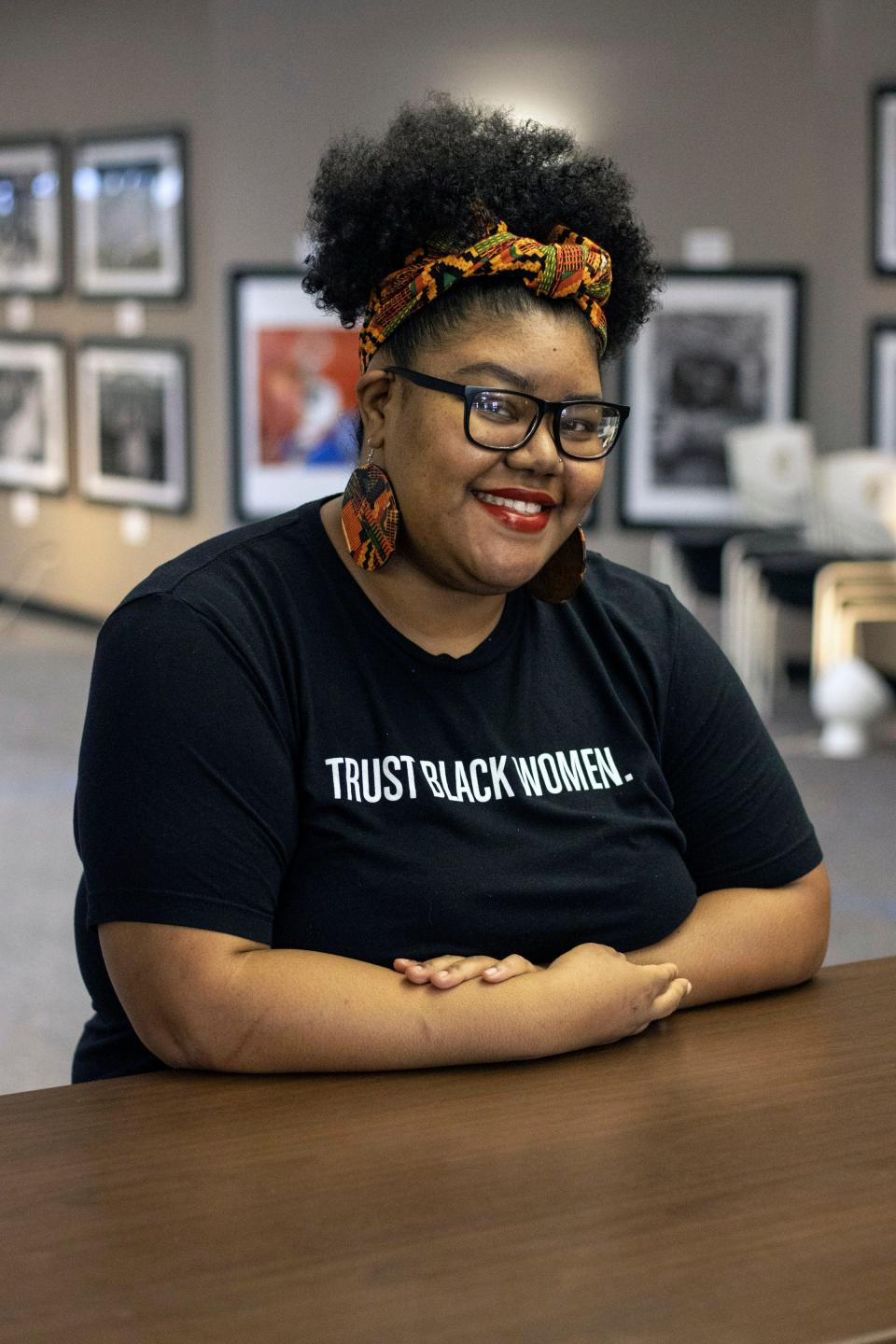'A celebration of Blackness': Everything you need to know about Kwanzaa in Louisville
- Oops!Something went wrong.Please try again later.
Editor's note: This story was originally published in 2019.
Kristen Williams started celebrating Kwanzaa when her son was born five years ago.
The executive director of an African American family and home school collective, Williams says Black children are "othered" in almost every space they exist in — from classrooms to the dentist office. She wanted to create a world in which her son, Agyei, felt normal.
And Kwanzaa, the seven-day festival that celebrates African and African American culture and history, was a big part of making that happen for their family.
It helps them remember what African Americans have done for centuries to prevail against all odds — to stay healthy, strong and resilient.
Previously: On heels of national social justice movement, what will Kwanzaa look like in Louisville?
Celebrating Nguzo Saba, the seven core principles of Kwanzaa, is deeper than a holiday, Williams said. It's about rejecting Americanized stereotypes of Black culture. Williams incorporates the festival's teachings all year long in her home school curriculum at Lyles Mall, 2600 W. Broadway.
"It’s important for our Black children to know who they are, not who they’re told to be," Williams told The Courier Journal. "We don’t do Kwanzaa for anyone else, and it’s not going to adjust the way the world sees us. It’s not for the world, it’s for Black people to reconnect and heal."
In the spirit of Kwanzaa's community-building principles, different local groups and organizations, including Williams' home school collective, have come together in the last year to actively organize Kwanzaa events for each day of the celebration this year.
A relatively modern tradition, Kwanzaa is often thrown in as the "other" holiday this time of year. But the nonreligious celebration is unlike Christmas and Hanukkah — it's all about connecting a rich African and African American history to Louisville communities and families.

What is Kwanzaa?
Kwanzaa is a seven-day festival held annually from Dec. 26 to Jan. 1 that celebrates African and African American culture and history.
It was created by Maulana Karenga, an African American professor of Africana studies at California State University in 1966. Karenga wanted a way to bring African Americans together to remember their Black culture.
The name Kwanzaa comes from the phrase matunda ya kwanza, which means "first fruits" in Swahili, an Eastern African language spoken in countries including Kenya, Uganda, Tanzania, Mozambique and Zimbabwe.
Karenga chose Swahili to name the tradition because it is the most widely spoken language for people celebrating pan-Africanism, the concept of Black people all over the world feeling a sense of unity and striving to restore the African continent and themselves against racism and oppression, Williams said.
"Swahili has become a mother tongue, a language from the home continent, at the very least, that wasn’t given to us by colonizers or enslavers," Williams said.
Opinion: How to practice self-care and manage the holiday blues
Karenga researched African harvest celebrations and combined aspects of several different celebrations, such as those of the Ashanti and those of the Zulu, to form the foundation of Kwanzaa. It's based on the practice of people coming together to celebrate and give thanks for the good things in their lives and communities.
Karenga was involved in the civil rights movement of the 1960s and '70s and was a member of the Black Panther Party. That she is only 78 years old speaks to the newness of the growing tradition.
What is the Kinara?
The kinara holds seven candles, the Mishumaa Saba, which is three red candles on the left, and three green on the right with a Black candle in the center that represents the African flag.
Each night during Kwanzaa, a candle is lit, similar to Hanukkah. The Black candle is lit first and then it alternates between the red and green candles starting with the ones on the outside and moving inwards.
Kwanzaa celebrations often include singing and dancing, storytelling, poetry reading, African drumming and feasting. Even though the official celebration is seven days long, the guiding principles are meant to be incorporated into daily life. The weeklong period is meant to reinforce the seven guiding principles of Nguzo Saba.
You may be interested: The holidays can be very stressful. Here are 4 tips to help keep your sobriety in check
What is Nguzo Saba?
Kwanzaa teaches seven principles, honored and celebrated on each day of the festival.
Day 1 Umoja (Unity): Unity of the family, community, nation and race.
Day 2 Kujichagulia (Self-Determination): Being responsible for your own conduct and behavior.
Day 3 Ujima (Collective work and responsibility): Working to help one another and the community.
Day 4 Ujamaa (Cooperative economics): Working to build shops and businesses. Many who celebrate Kwanzaa will actively shop from Black businesses.
Day 5 Nia (Purpose): Remembering and restoring African and African American cultures, customs and history. The idea and teaching of "I am, only because we are," Williams said.
Day 6 Kuumba (Creativity): To do always as much as we can, in the way we can, in order to leave our community more beautiful and beneficial than we inherited it. "It's also culturally about ingenuity and using limited resources, because historically, that's what Black people have had to do in order to survive and thrive," Williams said. "In this belief, we will always make a way."
Day 7 Imani (Faith): Believing in people, families, leaders, teachers and the righteousness of the African American struggle. "Kwanzaa is a nonreligious holiday, but we believe in a higher power and purpose, that faith is important for a better future," Williams said.
Support local journalism
Support stories like this one by becoming a subscriber today! Get unlimited digital access here!
What are other Kwanzaa symbols?
Kwanzaa is often associated with corn and other crops. Here are what the other symbols of Kwanza mean:
Mkeka: A woven mat made of fabric, raffia or paper. The other symbols are placed on the Mkeka. It symbolizes experiences and foundations
Kikombe cha Umoja: The unity cup represents family and community. It is filled with water, fruit juice or wine. A little is poured out to remember the ancestors. The cup is shared between people and each person takes a sip.
Mazao: The crops from the harvest. These normally include bananas, mangoes, peaches, plantains and oranges.
Muhindi: The corn. There is one ear of corn of each child in the family. If there are no children in the family, then one ear is used to represent the children in the community.
Zawadi: Gifts given to children during Kwanzaa are normally educational or handmade, often to remind them of their African heritage.
Kente cloth: A brightly colored material, usually red, green and yellow print, for items of clothing.
You may like: This man is addressing diversity head-on to help Louisville's tourism industry change
How is Kwanzaa celebrated locally?
The principles of Kwanzaa are also felt in the drum circles at River City Drum Corp every week of the year, not just in the December.
When the young students at 3308 Chauncey Ave. start classes, they design their own drums using PVC pipes. And when they set up for class and work together to grow as musicians, they are practicing Nguzo Saba, said Albert Shumake, executive director of the River City Drum Corp.
The cultural organization, which uses drums as an incentive to get children excited about academics, is founded around the principles of Kwanzaa. And they're used as a guideline for anyone who is trying to create a better life for themselves and around them, Shumake said.
"We believe that students who absorb the Nguzo Saba and put it into play have an advantage over those who don't," he said. "It gives our students a compass to their destination in life."
Kwanzaa is a 'celebration of Blackness'
For many like Christian Butler, Kwanzaa is a reminder of who she is and where she comes from. But she didn't always celebrate the festival.
It wasn't until Butler was older that she realized that the principles of Kwanzaa are not exclusive to Black culture, but rather a "grand representation of Blackness," she said.
Now, the 30-year-old Newburg native who owns a cupcake and catering company is embracing all things Kwanzaa.
Butler recently started making and selling decorative items covered in Kente cloth, the traditional African pattern. She's made earrings, candles and phone cases with the pattern for her company, Kloth'd by Noopie.

Butler even makes Christmas ornaments covered in Kente cloth. Many think Kwanzaa is an alternative to the Christian holiday, but many in the Kwanzaa community, like Butler, celebrate both holidays.
The holiday has become a bridge between African roots and African American identity, Butler said.
"It’s about paying homage to culture elsewhere and still being able to have something of our own that was not stripped away," she told The Courier Journal.
Celebrating Kwanzaa makes a statement of Blackness, she added.
"The world is not color blind," Butler said. "So when you say you don’t see color, you're saying don’t see me. But I am here, I have a voice, I am a queen. I have to identify who I am and not the image I have been painted or portrayed as a Black woman.
"And that’s what Kwanzaa is about, along with reinforcing the culture and beliefs."
This article originally appeared on Louisville Courier Journal: Kwanzaa 2021: What is the holiday and how does Louisville celebrate

